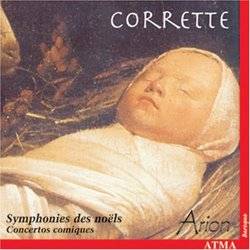| All Artists: Michel Corrette, Ensemble Arion Title: Corrette: Symphonies des noŽls; Concertos comiques /Ensemble Arion Members Wishing: 0 Total Copies: 0 Label: Atma Classique Release Date: 12/14/1999 Genres: Special Interest, Classical Styles: Holiday & Wedding, Opera & Classical Vocal, Forms & Genres, Concertos, Historical Periods, Baroque (c.1600-1750), Symphonies Number of Discs: 1 SwapaCD Credits: 1 UPC: 722056219228 |
Search - Michel Corrette, Ensemble Arion :: Corrette: Symphonies des noŽls; Concertos comiques /Ensemble Arion
 | Michel Corrette, Ensemble Arion Corrette: Symphonies des noŽls; Concertos comiques /Ensemble Arion Genres: Special Interest, Classical
|
Larger Image |
CD Details |
CD ReviewsExuberant, Easy to Understand, Full of Foot-Tapping Rhythms Leslie Richford | Selsingen, Lower Saxony | 03/19/2008 (5 out of 5 stars) "Michel Corrette (1707 - 1795): Symphonies des noels (Paris 1781) Nos. 2,4,5 und 6; Concertos comiques (Paris 1733 - 1752 - 1760) Nos. 4, 7, 19, 24 und 25. Performed by: L'Ensemble Arion [Claire Guimond, baroque flute and percussion; Chantal Remillard, Olivier Brault und Hélène Plouffe, violins; Elisabeth Comtois, viola; Betsy MacMillan, viola da gamba; Hank Knox, harpsichord]. Recorded in May 1999 in Saint-Augustin's Church in Saint-Augustin-de-Mirabel, Quebec, Canada. Producer/Engineer: Johanne Goyette. First published in 1999 as Atma ACD 2 2192. Total playing time: 66'52".
Michel Corrette belonged to the most important composers in French musical life between the years 1730 and 1760. He was active as an organist, composer, author of musical textbooks and publisher, but he had the bad luck to outlive his own popularity; a contemporary musicologist passed judgement with the words: "Corrette was a prolific composer, but his work died before he did" (quoted from the accompanying essay by Francois Filiatrault). Corrette was and remained a baroque composer all his life, and his music must have seemed quite old-fashioned from about 1760 onwards. As far as quality is concerned, even the concertos presented here cannot anywhere near match up to the splendours of some of Corrette's more famous contemporaries (Handel, Rameau). However, they do have one big advantage: They take up and use numerous popular melodies of the late 17th and early 18th centuries and are exuberant, easy to understand, full of foot-tapping, dance-like rhythms and, in their slow movements, charmingly peaceful. Anyone who is familiar with the music of Rameau, Campra, Lully or Forqueray will hear similarities to all of them, and I suspect they may have been drawing from a common well (in Track 10, for example, Corrette uses a melody by Lully which is also quoted in a famous Christmas piece by Gossec). Arion obviously had great fun performing and recording these pieces, and the result is a valuable edition dedicated to a composer whose name is probably a lot better known than his music. I can scarcely believe that anyone could listen to this CD without at least beginning to share its joie de vivre. As Johanne Goyette's recording can be classified, if not in the absolute top category, as good to very good, purchasers can repeatedly look forward to an uplifting hour of musical delights." |

 Track Listings (37) - Disc #1
Track Listings (37) - Disc #1